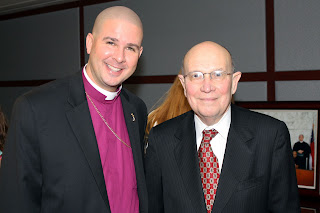ALMIGHTY and everlasting God, who by thy Holy Spirit didst preside in the Council of the blessed Apostles, and hast promised, through thy Son Jesus Christ, to be with thy Church to the end of the world; We beseech thee to be with the Council of thy Church here assembled in thy Name and Presence. Save us from all error, ignorance, pride, and prejudice; and of thy great mercy vouchsafe, we beseech thee, so to direct, sanctify, and govern us in our work, by the mighty power of the Holy Ghost, that the comfortable Gospel of Christ may be truly preached, truly received, and truly followed, in all places, to the breaking down the kingdom of sin, Satan, and death; till at length the whole of thy dispersed sheep, being gathered into one fold, shall become partakers of everlasting life; through the merits and death of Jesus Christ our Saviour. Amen.
The Synod of the Diocese of the Eastern United States of the Anglican Province of America will be held from Monday 9th July until Friday 13th July 2012. This year, it is sponsored by Saint Paul's Church, Melbourne, Florida. Of your Christian charity, please pray earnestly for the impending Synod and for its ministry and work, as it seeks to conduct the administrative business of the Church according to the mind of Christ and His Gospel and to advance the mission, governing, formation, preaching, teaching and evangelistic outreach of our unique branch of Christ’s Holy Church.
The word Synod, which term may be new or unfamiliar to many, is taken from the Greek word σύνοδος (sunodos) meaning ‘assembly’ or ‘meeting,’ and it is synonymous with the Latin word concilium, meaning ‘council.’ Synod liter
In short, Synod is the Church, one in heart, mind, and soul, on pilgrimage. All of the Christian life is described in Apostolic Tradition as being a pilgrimage: we are on a pilgrimage through this mortal world to our true heavenly homeland. We are the Pilgrim People of God, the Church, making our way as God’s ecclesia, His ‘called-out ones’, through this world to the next. Everything we do, pray, say and think as Christians should orientate us towards the ultimate, final goal, the final reward and promise, which is eternal life in Our Lord Jesus Christ, in the heavenly Jerusalem. If the vocation of the Christian in this life is pilgrimage, the wayfaring journey through this vale of tears to heaven, then the gathering of the Church in Synod, journeying together, should be seen as a microcosm of what the whole of the Christian life genuinely entails.
Synod is also the Church dynamically revealed as communion. The historic ecclesiology of the Great Church is a eucharistic ecclesiology based on the Holy Communion as the source and summit of the Church's life and on the episcopate as the continuation of the apostolic ministry. Holy Altar, Holy Sacrament, Holy People and Holy Order are inseparable. 'The Sacraments for the Saints.' 'Holy Things for the Holy People.' The Body of Christ in heaven and the Body of Christ in the Eucharist are one with the Body of Christ, the Church. That ecclesiology as espoused in the second and third centuries has been generally received by Anglicanism: a true 'Church' is a bishop in the historic succession, designated for a geographical area, presiding in love at the eucharistic altar with his presbyterate, diaconate and faithful people gathered with him in sacramental communion. A true Church, according to the Tradition of the Church as a whole, requires a true bishop, a geographical jurisdiction, and the People of God established incommunicatio in sacris. Any local particular Church with these characteristics is rendered a true Church, according the model universally held since the time of Saint Ignatius of Antioch and Saint Clement of Rome, the age of the Apostolic Fathers of the second-century. The Church universal is the worldwide communion, the oecumene, of local particular eucharistic assemblies - the One Church is by definition a Communion of Communions. The unity and catholicity of the Church inheres in the communion of the People of God with their local bishops and the communion of the bishops with one another, what Saint Cyprian of Carthage calls the 'undivided episcopate.' Synod is the ideal expression of this principle, a visible manifestation of the Church as Church, as communion.








